 Somewhere out there, there is a game that speaks to an individual. The mechanisms coalesce with theme into a work of art that only a single person might appreciate. While other individuals might think the work trite, immature, or misguided, for that one person, everything is just right.
Somewhere out there, there is a game that speaks to an individual. The mechanisms coalesce with theme into a work of art that only a single person might appreciate. While other individuals might think the work trite, immature, or misguided, for that one person, everything is just right.
When we, as reviewers receive review copies of games, we’re obligated to try and set aside prejudices with regards to what designers and publishers think a game needs and evaluate it for what it is. In the case of Master of Wills, a new game from new publisher Stormcrest Games, the ask is bold.
Master of Wills is a customizable card game about winning over individuals from various factions to your particular side’s ulterior motives. It has a central mechanism that creates a game somewhere between Magic: The Gathering and an area control game. It’s a game for 2 players and a single game takes about 45 minutes to play.
Gameplay Overview:
Each game of Master of Wills is played over 8 rounds. Each round is 2 turns of one player and 2 turns of the other player. After each round, the round marker is advanced; more about this later.
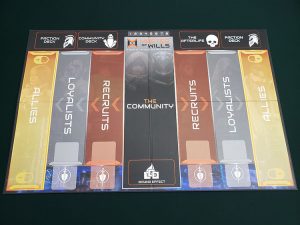
The board is divided into 7 zones. The neutral area where new community cards are placed is the central area of the board. On either side are zones where community cards will move. The zones are for recruits in brown, loyalists in silver, and, finally, an allies area in gold. Only the allies area has any particular restrictions. Community cards here cannot be moved or killed.
On a turn, players first choose a single card in the community and use the movement colors and values at the top of the card to first move that card to a zone, then proceed to move other cards. For example, when a Homeless Guy is selected, he first moves into the recruits area on that player’s side of the board. Then, he moves one purple card one space towards the activating player’s side and then makes two movements of red cards towards the opponent.

Once that is complete, there are two other icons that could appear at the top of a card. The first is the community symbol, which indicates a new card is drawn from the community deck and enters the neutral area. The second symbol, which is rarer, gives the player a chance to play a faction card from their hand.
The faction decks that each player has are constructed before play. There are specific rules for deck construction, but, generally, it is much better to play an introductory game with the full faction deck and then play a game with a constructed deck once the rules are familiar.
At the end of the game, players count up the point values for every community card on their side of the board. The higher score wins the game. Some faction cards could also modify these values.
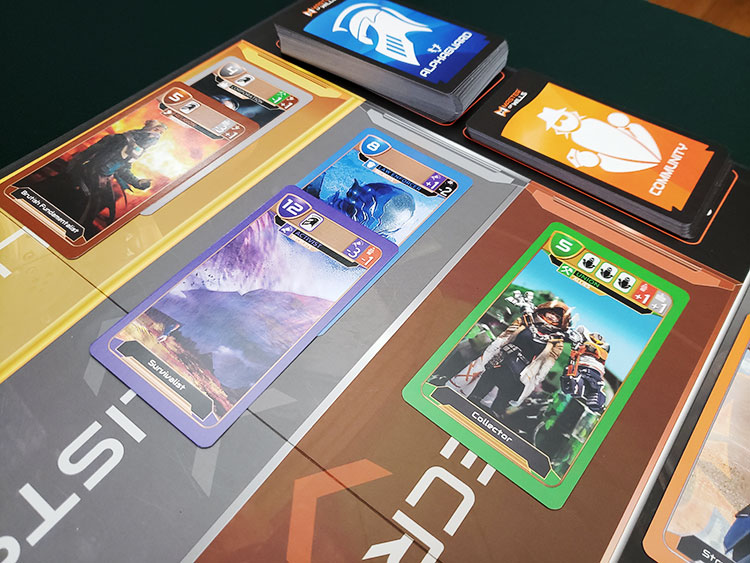
Game Experience:
Master of Wills is an odd duck. At times it can feel very interesting and engaging, but that’s only 20% of the time. The rest of the time, it ignores the goals it sets out for itself.
Here’s the crux of the problem. Most of the time, in this ostensible deck construction game, players are not playing the cards from their constructed decks. They’re moving cards from the Community around the board. What could be an extremely engaging battle for influence over the Community devolves into something that feels like a drafting game with each turn blurring into the next.
To this reviewer, this is infuriating. Each play of Master of Wills lies to you about its use of theme, its motivation to drive engagement, and, worst, ignores the potential of such a unique game style. This is even more enraging because the potential of the game can be unlocked with relatively small changes to the design.
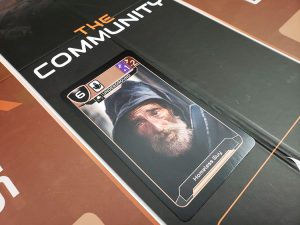
The second issue revolves around components. It’s understandable that to keep costs low for this first time publisher, as they opted to use cards of all the same size for the Community and Faction decks. What’s less comprehensible is that the cards are not a standard size (they’re extra tall, close to Tarot size) and have no justification for the odd size.
If that weren’t enough, the cards for the Community don’t need to be cards. It would make more sense and be easier to manage if they were tokens, smaller but easier to move around. Due to how much movement the Community cards see, a rework of this component needs some thought.
Now, finally, there is one big niggle. The round tracker doesn’t track turns, only rounds. With each player alternating turns, there was often a slow spot trying to remember how many turns each player had in order to move to the next round. This may seem ridiculous, but turns can take a minute or two and players can quickly forget which turn of the round it is while trying to figure out a plan. Again, an issue that can fixed easily. [Reviewers Comment: As indicated by comments below, we played this wrong. Rounds are 1 turn for each player.]
Final Thoughts:
Master of Wills is not a bad game. It has some really engaging moments, but it’s clearly not ready for the community of gamers. It needs some more development with critical game testers. It’s an effort that feels like it was tested too much with the designer and friends of the designer. The real excitement of Master of Wills is not implemented well enough and what’s left is fiddly and inelegant, despite the beauty of the production.
Final Score: 2.5 Stars – What feels like it should be a masterfully crafted experience falls on its face due to unforced errors in design and component manipulation.
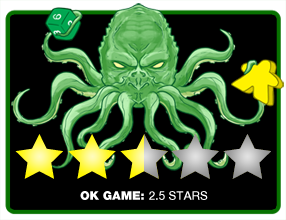 Hits:
Hits:
• Awesome theme
• Stylish and well produced cards
Misses:
• Repetitive unengaging turns
• Component design could be better








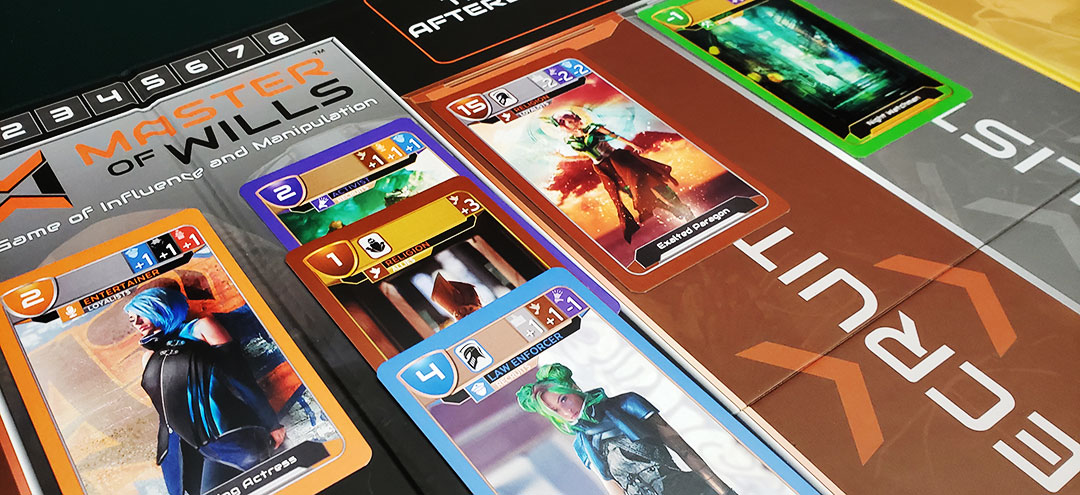















I’m a huge fan of the game, so obviously I disagree with your review a bit, but I wanted to chime in and just share some insight on some points I think you’ve missed.
1. A round is just one turn per person. I’m not quite sure where you got that it’s two turns each. As such, the games are much shorter than the time you mentioned and the rounds are much easier to track. The person going second always moves the counter at the end of their turn.
2. I agree that the oversize cards seems an odd choice. My guess is that they wanted to showcase the art to help draw people into the world. Having tokens or smaller cards would be much less immersive.
3. Might just be a typo, but your description of what moving “Homeless Guy” does is wrong. No card has both positive and negatives for the same community.
4. I get that some people might see this type of game as just a “find the best move” type, but that’s pretty short-sighted in my experience with the game. It’s a bit of a mental match between players, especially once you’re more familiar with the cards available to a faction, and trying to figure out how to take advantage of your faction plays and not fall into traps your opponent has set. It’s also often a balance between whether you want a faction play that turn, as many of the movement cards can be very strong in their own right.
Anyway, just wanted to share some thoughts and insight. I respect your view, but think you might have missed some key things that are what I really enjoy about the game. Cheers!
Hi Chris, thanks for the feedback. My comments for yours:
1 – Looks like we misinterpreted that.
3 – That’s a typo. It should describe the effects for the red faction. I’ll get that text fixed in the article.
Thanks for catching those. To be honest, the game being shorter would have improved it, but not by much in our eyes. I would give it 2.5 stars at best if a couple of things were fixed. We never managed to escape the feeling of just playing cards to move other cards around. The link to what you do mechanically to what you do thematically was just too removed for us.